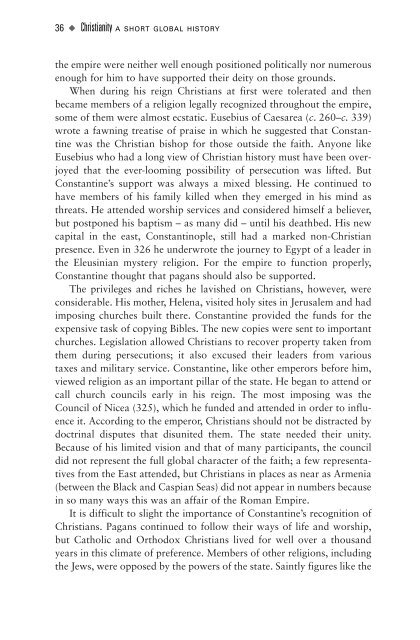Download File - JOHN J. HADDAD, Ph.D.
Download File - JOHN J. HADDAD, Ph.D.
Download File - JOHN J. HADDAD, Ph.D.
Create successful ePaper yourself
Turn your PDF publications into a flip-book with our unique Google optimized e-Paper software.
36 ◆ Christianity A SHORT GLOBAL HISTORY<br />
the empire were neither well enough positioned politically nor numerous<br />
enough for him to have supported their deity on those grounds.<br />
When during his reign Christians at first were tolerated and then<br />
became members of a religion legally recognized throughout the empire,<br />
some of them were almost ecstatic. Eusebius of Caesarea (c. 260–c. 339)<br />
wrote a fawning treatise of praise in which he suggested that Constantine<br />
was the Christian bishop for those outside the faith. Anyone like<br />
Eusebius who had a long view of Christian history must have been overjoyed<br />
that the ever-looming possibility of persecution was lifted. But<br />
Constantine’s support was always a mixed blessing. He continued to<br />
have members of his family killed when they emerged in his mind as<br />
threats. He attended worship services and considered himself a believer,<br />
but postponed his baptism – as many did – until his deathbed. His new<br />
capital in the east, Constantinople, still had a marked non-Christian<br />
presence. Even in 326 he underwrote the journey to Egypt of a leader in<br />
the Eleusinian mystery religion. For the empire to function properly,<br />
Constantine thought that pagans should also be supported.<br />
The privileges and riches he lavished on Christians, however, were<br />
considerable. His mother, Helena, visited holy sites in Jerusalem and had<br />
imposing churches built there. Constantine provided the funds for the<br />
expensive task of copying Bibles. The new copies were sent to important<br />
churches. Legislation allowed Christians to recover property taken from<br />
them during persecutions; it also excused their leaders from various<br />
taxes and military service. Constantine, like other emperors before him,<br />
viewed religion as an important pillar of the state. He began to attend or<br />
call church councils early in his reign. The most imposing was the<br />
Council of Nicea (325), which he funded and attended in order to influence<br />
it. According to the emperor, Christians should not be distracted by<br />
doctrinal disputes that disunited them. The state needed their unity.<br />
Because of his limited vision and that of many participants, the council<br />
did not represent the full global character of the faith; a few representatives<br />
from the East attended, but Christians in places as near as Armenia<br />
(between the Black and Caspian Seas) did not appear in numbers because<br />
in so many ways this was an affair of the Roman Empire.<br />
It is difficult to slight the importance of Constantine’s recognition of<br />
Christians. Pagans continued to follow their ways of life and worship,<br />
but Catholic and Orthodox Christians lived for well over a thousand<br />
years in this climate of preference. Members of other religions, including<br />
the Jews, were opposed by the powers of the state. Saintly figures like the
















